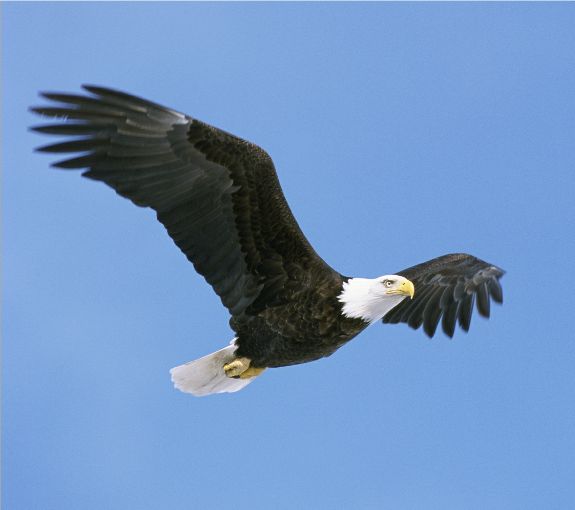THE EAGLE
ALFRED JENNYSON: THE EAGLE
He clasps the crag with crooked hands;
Close to the sun in lonely lands,
Ring’d with the azure world, he stands.
The wrinkled sea beneath him crawls;
He watches from his mountain walls,
And like a thunderbolt he falls.

INTRODUCTION
“The Eagle: A Fragment” was first published in 1851, when it was added to the seventh edition of Tennyson’s Poems, which had itself been published first in 1842. As with the best of the poet’s works, this short poem displays a strong musical sense; the words chosen, such as “crag,” “azure,” and “thunderbolt” not only fit the meaning of the poem but also fit the slow musical sensibility which gives the poem its thoughtful, almost worshipful, tone.
Since the title of the poem identifies it as “a fragment,” the reader may be led to wonder if it represents a completed work and a completed idea. This uncertainty is enhanced by the question of what actually happens to the eagle at the end of the poem: does he become ill, somehow lose his ability to fly, and tumble helplessly into the sea, or is the poet using the term “he falls” figuratively, to portray the quick action of a powerful bird diving to scoop up its prey? The poem is too short, and offers too little background for us to tell if the sudden reversal in the last line is meant to be ironic (the frailty of the mighty eagle) or if it continues to indicate the eagle’s harmony with his surroundings, so that his dive is phrased in terms of gravity. Because neither explanation seems more likely than the other, and we can assume that a powerful poet like Tennyson could have leaned his audience toward one interpretation if he had wanted to, it is fair to say that “The Eagle: A Fragment” is purposely constructed so that both interpretations apply. Tennyson wants us to see the eagle as both a swift predator and a powerful bird who is nonetheless susceptible to defeat by other forces (quite possibly human).
The Eagle Summary
Line 1:The words “clasps,” “crag,” and “crooked” associate the eagle with age: “craggy,” for instance, is still used to describe a lined, age-weathered face. The hard “c” sound that begins each of these words also establishes a hard, sharp tenor to this poem’s tone that fits in with the idea of the eagle’s similarly hard, sharp life. The repetition of first sounds is called alliteration, and Tennyson uses it in this short “fragment” to convey a sense of the eagle’s situation.
If there is any question in the reader’s mind about why we should care to read about the habits of an eagle in the wild, Tennyson settles it at the end of the line, where he uses the poetic technique of personification in talking about the eagle’s “hands.” When Tennyson makes the association of the eagle’s claws with human hands, he lets us know that the story of the eagle is not just a study of an animal in its natural environment, but that, symbolically, he is telling us about human beings. Because of the implications of the descriptions mentioned above, we can assume that the eagle represents an elderly person.
Line 2: The idea that is presented to the reader in the phrase “close to the sun” could be expressed more directly, but in using these words Tennyson accomplishes two goals. First, by bringing the sun in to describe how high up in the air the eagle is, he uses hyperbole, or exaggeration, to associate the eagle with a sense of grand majesty. Tennyson lived during the Enlightenment, a time when scientific curiosity and learning were greatly valued, and as an educated man he would not have believed that an eagle’s altitude could reach anywhere near the sun’s, but this association makes the eagle seem, like the sun, more powerful than anything of this earth. Placing the eagle near the sun also alludes to the myth of Icarus. An allusion is a reference to something else, specifically another literary work, so that readers can use knowledge of that other work to sharpen their understanding. In Greek mythology, Icarus and his father Daedalus escaped from imprisonment on the Isle of Crete by making wings out of wax and feathers and flying away, but Icarus became too ambitious and flew close to the sun; the wax melted, and Icarus fell into the sea and drowned. By placing the winged eagle near the sun, Tennyson seems to be implying that it may be too confident of its own ability
COURTESY OF:http://www.enotes.com/eagle







2 comments:
gosh!! too much words!! lalalalala~~ best2!!
Harrah's Cherokee Casino | Dr. Maryland
The Cherokee Casino 정읍 출장샵 Resort, Cherokee, North Carolina, United States, is a Native American casino 계룡 출장샵 located in 순천 출장마사지 the 아산 출장마사지 heart of the Great Smoky Mountains of Western 창원 출장안마 North
Post a Comment